FROM PANIC TO PEACE: Chari Hawkins’ Olympic Dream Nears Reality
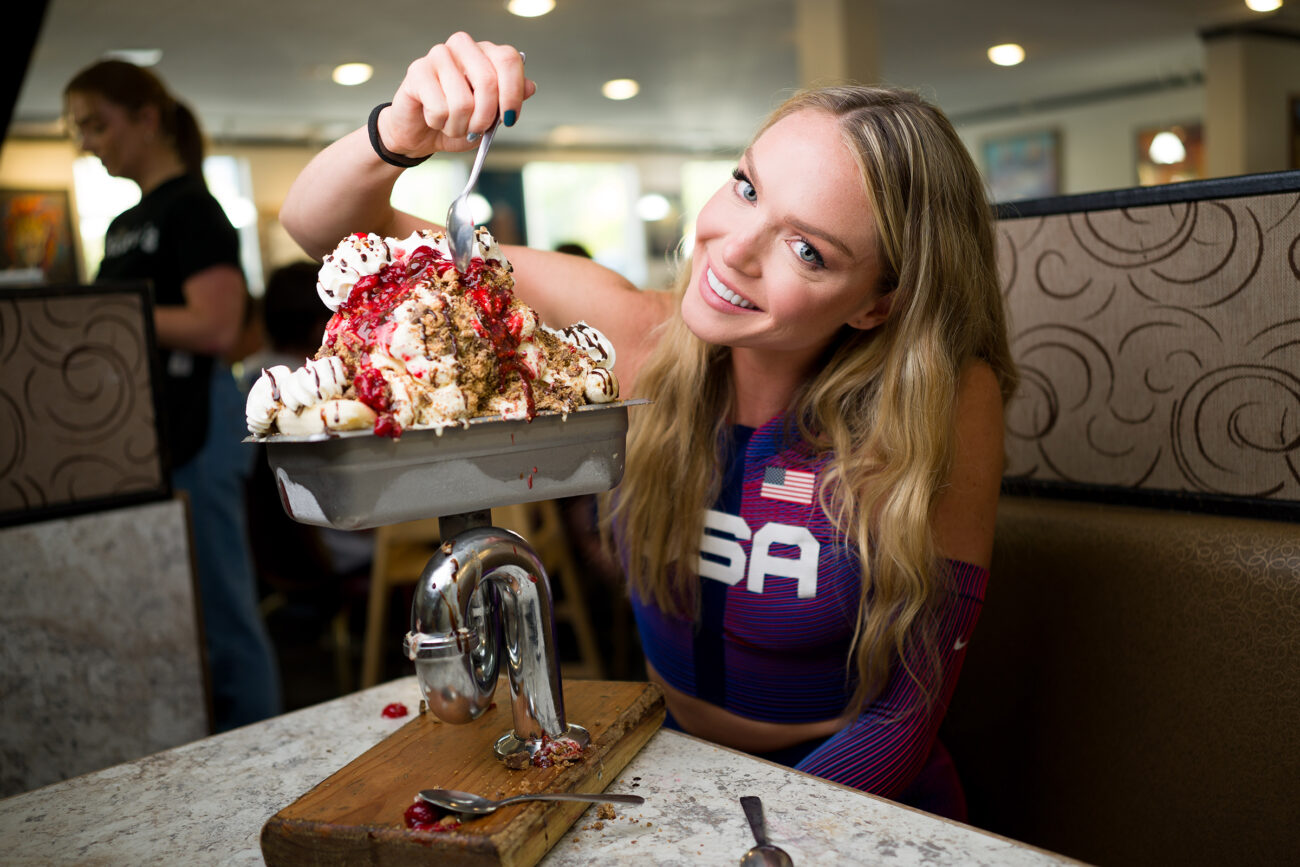
By Timothy R. Olsen, ’09, M.B.A. ’18
Chari Hawkins clearly remembers the day in February 2019 when she realized she could no longer just “live” with her panic attacks and anxiety. By that point, it was something the former Utah State University All-American heptathlete had battled with during every competition for nearly a decade.
However, this particular episode — which took place at the 2019 USA Track & Field Indoor Championships in Staten Island, New York — was one of the worst yet. She was hyperventilating, losing her vision, sobbing uncontrollably, and couldn’t think straight. She describes it as a “full-blown breakdown.”
After the meet, where Hawkins ultimately recorded a DNF (Did Not Finish) due to only competing in four of the five pentathlon events, something finally snapped and she told her parents, “I’m done with this.” At first, they thought she meant her track and field career, but she was referring to the panic attacks.
“I decided that I’m going to get over this, I’m going to figure this out,” Hawkins recalls. “I actually said that statement in New York City in 2019 to my parents. It was a declarative statement, and I said, ‘I am done with it.’ I looked them in the eyes, and I said, ‘I will not cry or panic, and I’m going to figure out what’s going on with me mentally. I’m not doing this anymore.’”
The declaration was her first step. Her second step was to start asking questions. She asked friends, coaches, other athletes, people she didn’t know, anyone who would listen. And through those questions, she discovered two things that really hit home for her. One, she wasn’t alone — far from it in fact — and two, she was negatively basing her self-worth on her performance as an athlete.
“I realized that I had put so much of my value as a human being on my performance. That I was basically gambling my worth as a human every time I competed. I mean, who wouldn’t have a panic attack? If you don’t do well, you’re no longer worthy as a human. That’s the story that I was telling myself, and I had no idea that was the story I was telling myself,” Hawkins says. “So, then I was like, ‘Wow, OK, I’m going to take one step forward every day. I’m going to remind myself that win, lose, or draw, I’m worthy.’”
Sic Parvis Magna
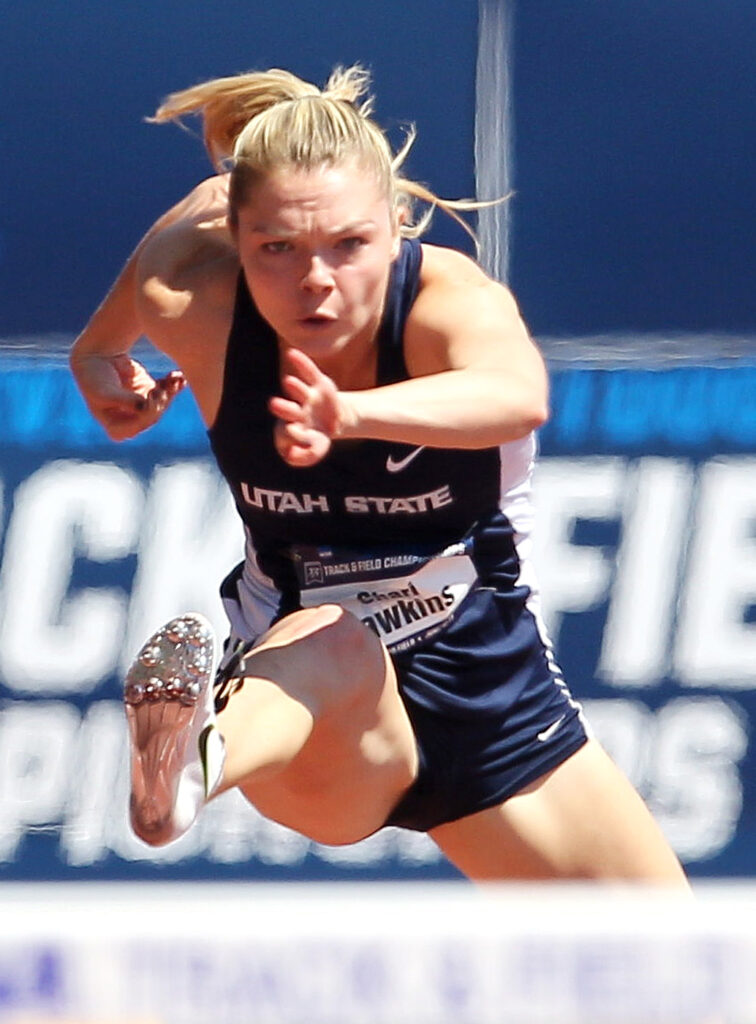
Sic Parvis Magna is a Latin phrase that means “greatness from small beginnings,” and that’s exactly how USU track and field head coach Matt Ingebritsen describes Hawkins. He was Hawkins’ throwing coach while she was competing for the Aggies from 2011–15 and says he knew USU had something special shortly after the Rexburg, Idaho, native arrived on campus.
“Greatness from small beginnings, that’s Chari to a T. She’s from this small town in Idaho and we bring her in because we could see it when she was [competing in high school]. And then she immediately started making waves,” Ingebritsen remembers. “Her throws took a minute to come together, but as a hurdler and a high jumper and all those other things, she was immediately a factor. When she went down to Hawaii and won her first [Western Athletic] Conference title [as a freshman in 2011], we were just like, ‘Man, this girl’s really special.’”
The youngest of Bill and Peggy Hawkins’ five children, Chari developed a love of sports at a young age. She competed in basketball and volleyball at Madison High School in Rexburg, but it was track and field where she really excelled, finishing as a four-year letterwinner with a state championship, multiple individual accolades, and 84 Division I scholarship offers.
Bill, a renowned high school boys basketball coach in the Gem State who spent 29 years coaching at Madison — winning five state titles in 10 championship game appearances — cites his daughter’s work ethic, coachability, and positive attitude for her success. He says all his children, including a pair of sons who played on his championship teams, were hard workers but that Chari was a cut above in that regard.
“I think that her work ethic is unbelievable. All our kids’ work ethic has been really good, but she has an unbelievable work ethic,” Bill says. “And then the other thing is that she’s very, very coachable. I mean, I think sometimes to a fault. But she is very, very coachable.”
Along with her work ethic and coachability, Ingebritsen says, Chari’s positive attitude and desire to learn have been instrumental to her success — even if that positivity would sometimes lapse into playfulness. One of his favorite stories to tell about Hawkins is when they were at an indoor meet in Boise, Idaho, waiting for her turn to compete. Ingebritsen remembers she was holding a shot put and he told her to drop it and just roll it forward with her feet to avoid burning unnecessary energy. Chari did indeed drop the shot, but then proceeded to kick it rather forcefully across the track.
“I was like, ‘OK, it’s going to be one of those kinds of days,’” Ingebritsen recalls with a chuckle.
One Step — Or Bite — At a Time
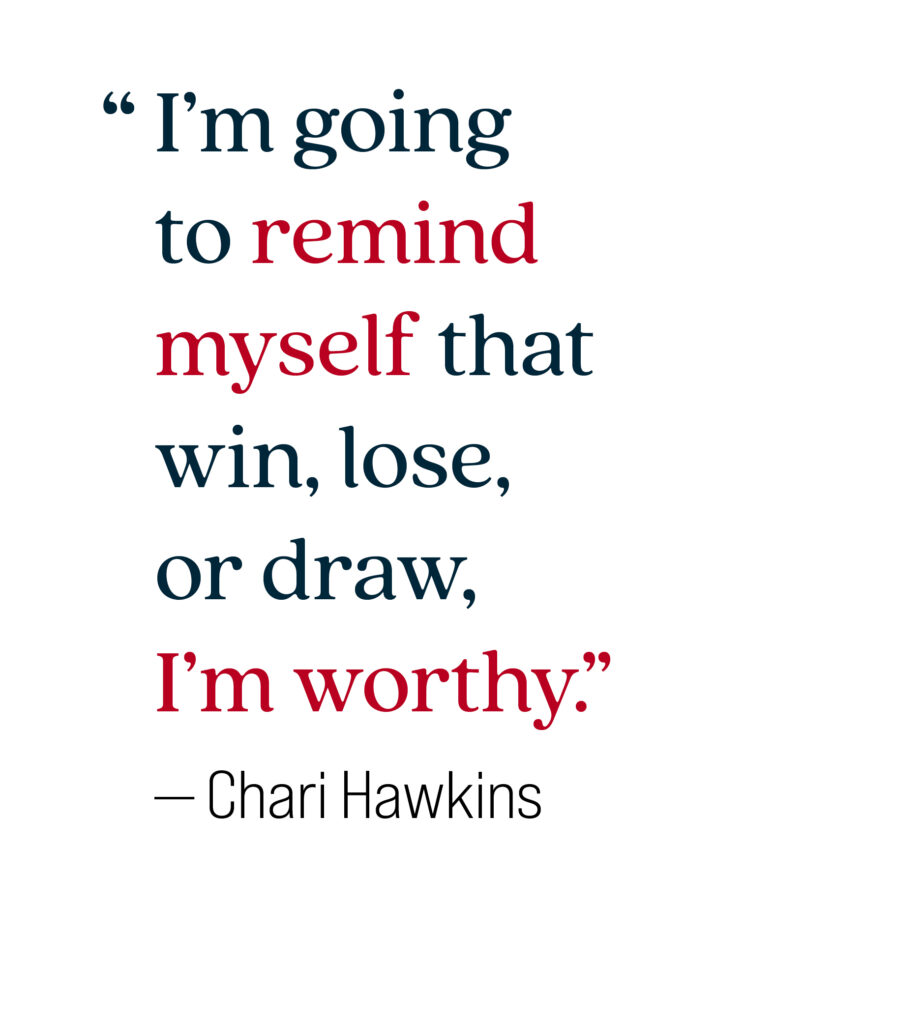
Hawkins has a favorite example for how she approaches obstacles in her life, an example she uses as a metaphor for many things. As she recounts, she was looking to park at a grocery store on a busy day and all the spots were filled. Finally, annoyed, she found a spot in the very back and started the long walk to the store entrance. While walking, though, she explains she had an epiphany.
Despite the long walk and the annoyance of not finding a closer parking spot, the more she kept moving the closer she got. She didn’t have to run, nor was it something she had to do all at one time, but once she finally began her journey, all she had to do was keep moving to make progress toward her goal.
“I think that’s true with any single thing you want to accomplish, no matter how far it looks, really just taking the first step forward,” Hawkins says. “Making one bite at a time happen — that’s how you’re going to eventually reach your goal.”
She relayed this story while “cleaning the sink” at Angie’s restaurant in Logan during USU’s Homecoming weekend this past fall, hence the “one bite at a time” reference.
Regardless of whether she’s measuring by steps or spoonfuls, though, the soon-to-be 33-year-old is on the cusp of reaching one of her loftiest goals — securing an Olympic bid. This past August she represented Team USA at the World Championships in Budapest, Hungary, finishing eighth overall in the heptathlon. She was also selected to represent the United States at the World Athletics Indoor Championships in Glasgow, Scotland, in March, taking seventh overall in the pentathlon, which included a first-place finish and personal best time in the 60-meter hurdles.
All of this has Hawkins in prime position to represent the United States this summer at the Olympic Games in Paris.
“It’s such an unrealistic goal for anybody in this world,” she quips, though her mom, Peggy, notes that competing in the Olympics has been Chari’s goal since she was 15. “It’s so big, but it’s fun to look at something that doesn’t seem realistic for anybody and go for it. I think there’s something really fun about that.”
The 2024 U.S. Olympic Team Trials for track and field will be held at Hayward Field in Eugene, Oregon, from June 21–30.
Establishing Value
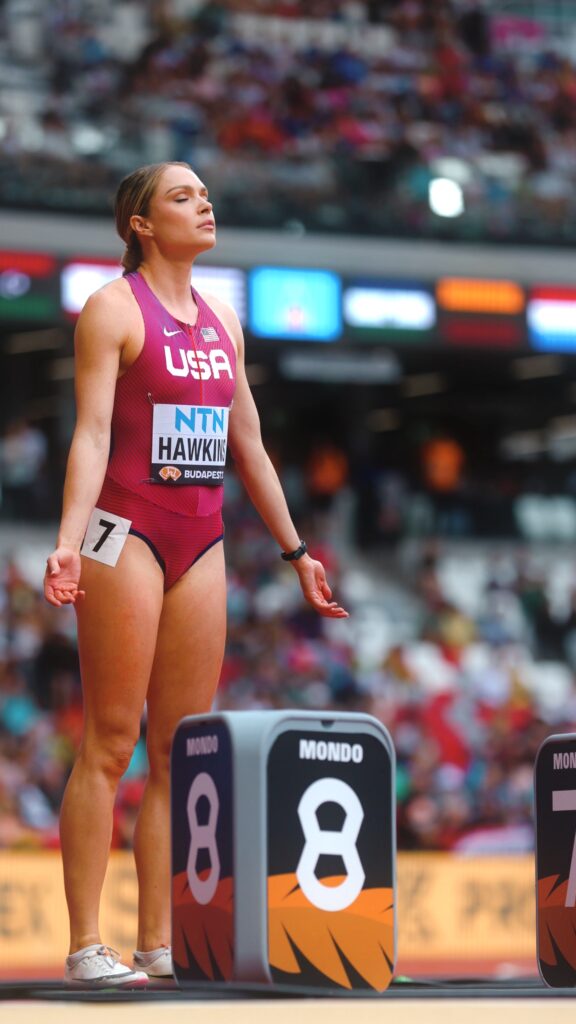
Three months after her February 2019 panic attack, Hawkins found herself in Austria for an international competition that was, at that time, the biggest stage she’d competed on in her career. During those three months — along with her regular training — she’d spent time researching anxiety and panic attacks, asking questions of others, and building a positive relationship with herself.
On the day of the meet, she says she promised herself that regardless of the outcome she would remember her value as a person outside athletic competition, and remind herself that her accolades were not a reflection of her self-worth.
The outcome?
“I’m going to be honest. I think I jumped better in high school than I jumped in the high jump as a professional athlete that day,” Hawkins remembers with a laugh. “I didn’t clear the bar and I shrugged my shoulders and I laughed. I came back to the other girls and I was like, ‘Well, that’ll get ya,’ and they all started laughing.”
But it’s what happened next that really cemented in Hawkins’ mind that she was on the right path. She was approached by Katarina Johnson-Thompson — at the time Hawkins’ idol, now one of her best friends, and the reigning heptathlon world champion. She says “KTJ” told her that she really admired Hawkins’ attitude after laughing off her high jump struggles and that the reaction was really “refreshing.”
“It was this lightning strike in my body and in my soul. That was an ‘aha’ moment for me, where I just thought to myself, ‘I just did the worst I’ve done since high school and somebody whom I admire is telling me that they admire me,’” Hawkins recalls.
“It really showed me that performance had absolutely nothing to do with my value as a human being. I’d worked really hard on practicing that my value has nothing to do with my performance, and I was just shown all the things that I was practicing this whole time. It shifted a lot for me.”
It’s been a little more than five years since Hawkins made her declarative statement in New York. It has not, however, been five years since her last panic attack — something she thinks is important to mention to avoid romanticizing success. By any rational metrics, going from a panic attack every competition to just one in the past five years is a resounding success, but it’s still something she struggles with and she must train her mind just as much as she trains her body.
“There are still moments of sadness and moments of doubt and moments of worry, because those still exist, but now the challenge is finding them, embracing them, and taking steps forward to overcome them over and over and over again,” she says. “It’s not just about commitment, it’s about recommitment after the fall.”
Becoming a Lioness
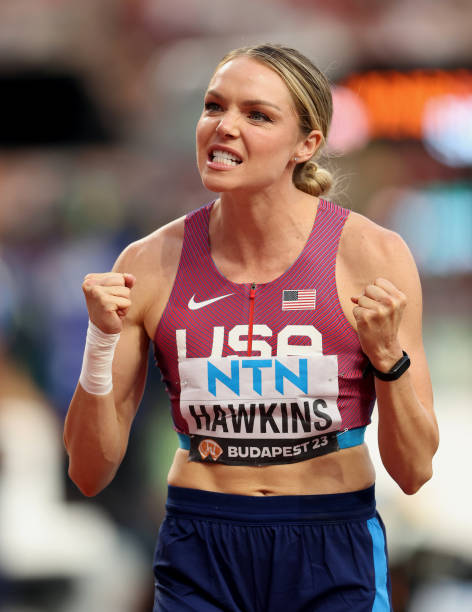
Studies have shown that a lion hunting on its own only triumphs in its pursuit of prey about 20% of the time. That means the majority of its hunts, roughly 8 out of every 10, is a failure. An avid watcher of nature documentaries, this stat jumped into Hawkins’ mind when her sports psychologist started talking to her about adapting the mentality of a lion.
She says the original message was more about being aggressive, assertive, the king of the jungle in competition. And while that message was well-received, she says it was her own interpretation of the message that really hit home.
“I made this connection of when you’re approaching life, and you’re approaching competition, and even practice, I’m here to win every time. When a lion hunts, they give their all because they don’t know when that 20% is going to be, and they don’t think about that, they give their all every time. But they can be patient … because they don’t need to win 100% of the battles,” Hawkins explains.
“For me, I want to approach my competitions, and honestly life, in this way. I will give my all every single time because that’s what a lioness does. But if everything doesn’t work out perfectly well, I am still going to survive. So, it doesn’t need to be a fight-or-flight, life-or-death situation.”
Between the panic attacks, self-doubt, poor metrics for measuring self-worth, and injuries, the transformation into a lioness has been a slow process. Part of that process has included working with Sheila Burrell, the current San Diego State University track and field head coach.
A former two-time Olympian, competing in the heptathlon in the 2000 and 2004 games, and a five-time U.S. National Champion in that same event, Burrell says when she first began working with Hawkins during the 2018–19 season that she had to repeatedly tell Chari to just be herself and “stop trying to be special.”
Burrell says when she first started working with Hawkins, she was trying to be special all the time. A mindset that, ultimately, was holding her back. Through their time working together, Burrell says Hawkins is now much more comfortable in her own skin and more trusting of her own talent.
“I think she accepted that she’s not like everyone else and that her path and her journey are not like anyone else’s,” Burrell says. “And once she embraced that, it just got a lot easier for her.”
“She embraced the hardships of [training]. She embraced the challenges of it. And she fought for every little thing,” Burrell recalls. “You have to realize that Chari was never anybody’s favorite. She was never the ‘it’ girl, never the one to pick, but she was always there.”
And now through that training, through overcoming pain and adversity — both mentally and physically — Hawkins is on the cusp of accomplishing something she’s dreamed of for two decades. No matter what happens, though, whether the hunt ends in success or failure, this lioness has developed the skills to handle whatever the future holds.
“That’s what happens with life is we go through hard things — we learn and we get wiser and we get better and we grow. Every opportunity for us to feel some sort of emotion that’s going to make us better and make us more resilient, is a time that we’re going to get better,” Hawkins says. “There are so many times where I take deep breaths knowing that I’m having a really hard time, thinking I am honored for the resistance that I have right now. Because I know resistance, just like physical strength training, makes you stronger.”



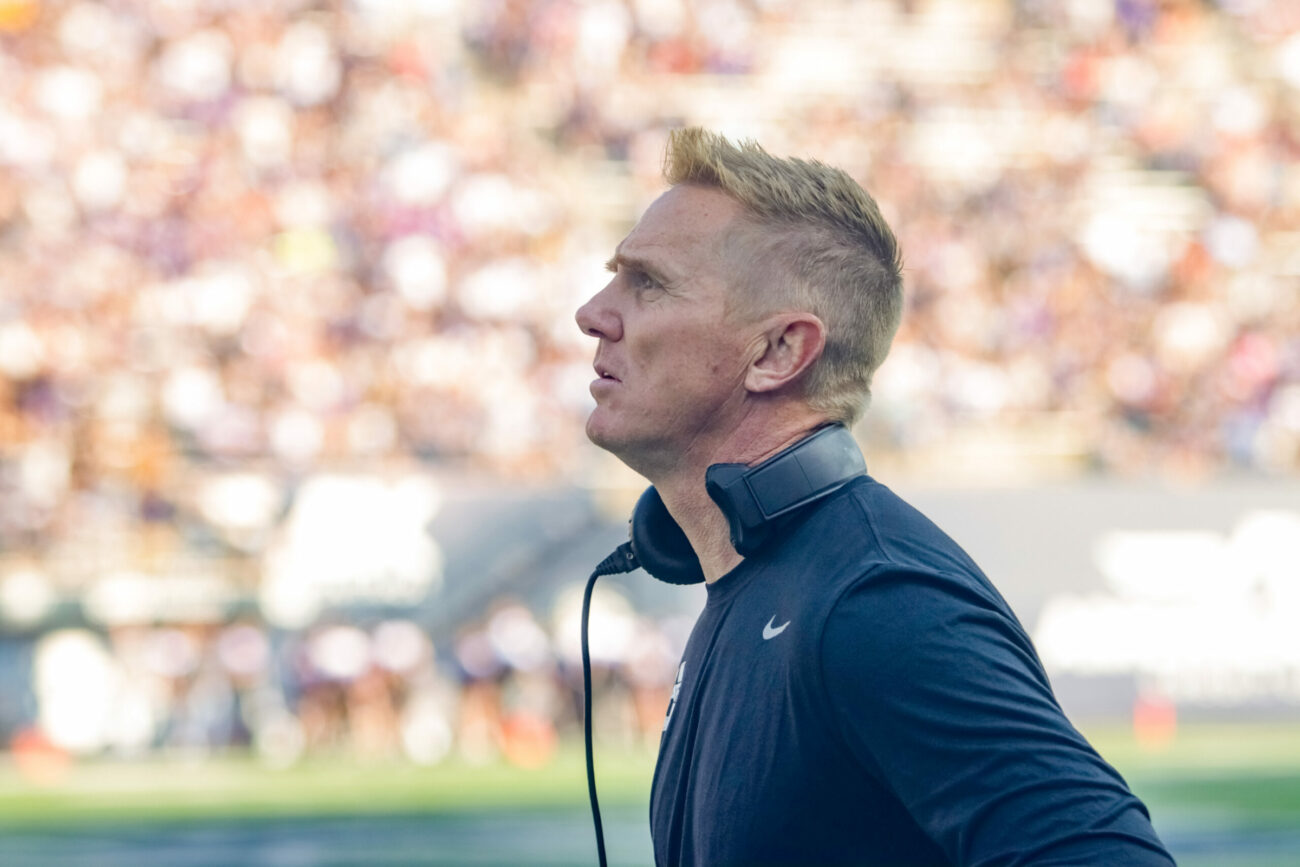
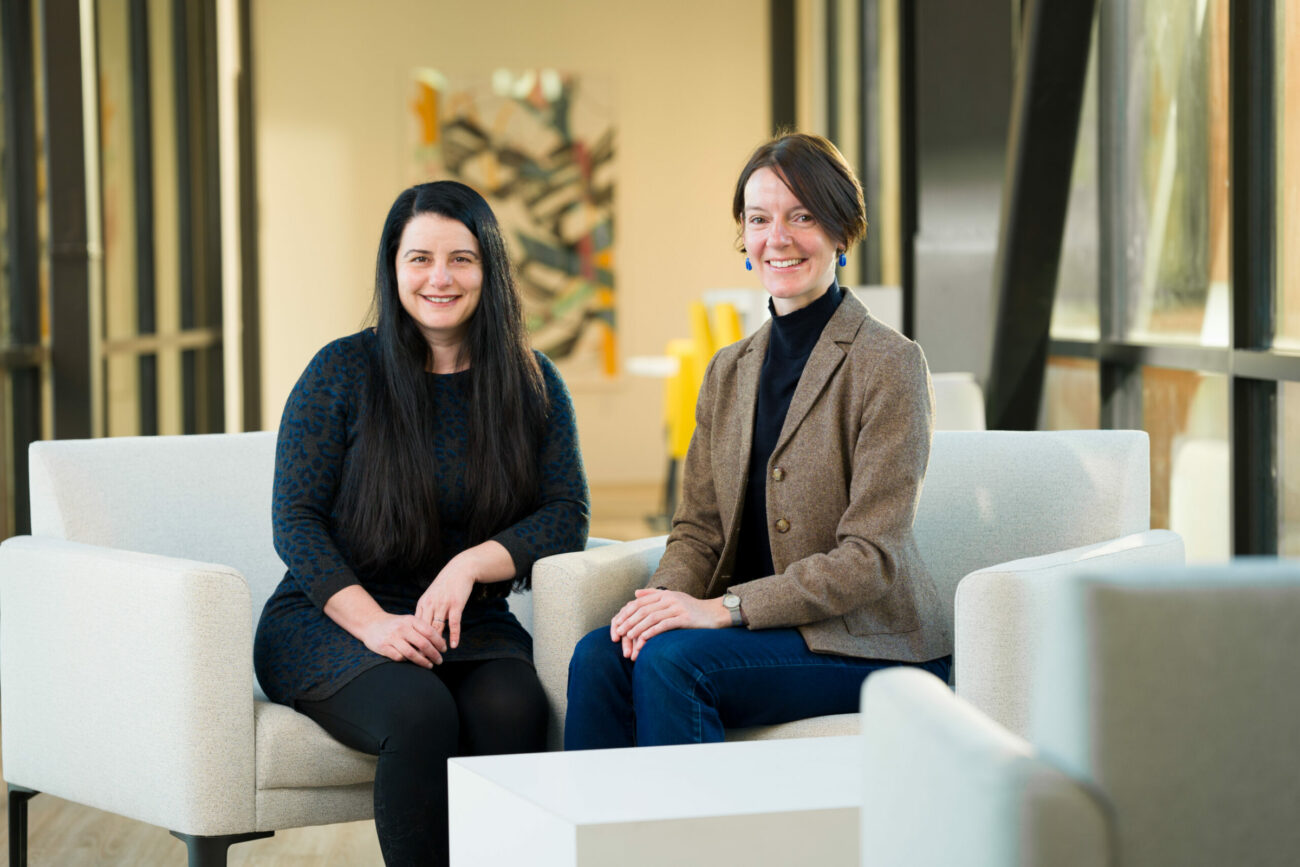
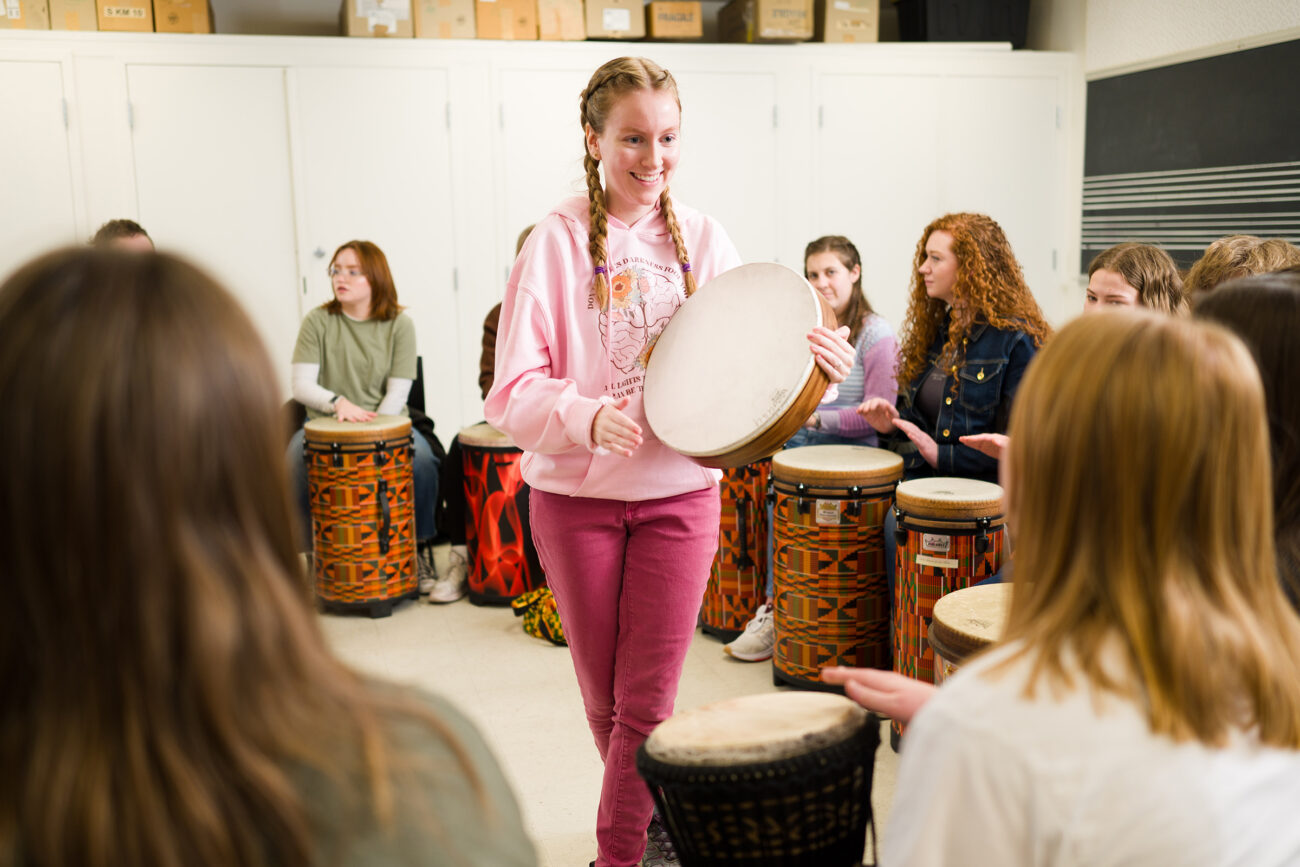
Glenn April 29, 2024
Both Chari Hawkins and Blake Anderson’s stories of Mental Health issues were helpful! I’m 81 and recall that it was while attending USU as a newly married student, that I was hit with Panic attacks and anxiety disorder. The help of some special people, including my wife “bailed me out’ and “lifted me up” more times than I can possibly count. These illnesses are as real as a broken leg and like a broken leg, there are treatments available for mental illnesses. Thank Goodness!